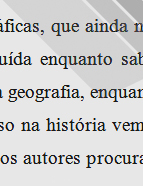

................................
Even in the 1930s, there were still few geographers, even for university teaching. Among those mentioned by Damião Peres were Teófilo Braga, Leite de Vasconcellos, Ricardo Severo, António Sardinha, Mendes Correia, and Jaime Cortesão. Some historians and geographers, including Amorim Girão, argued that the Western Iberian Peninsula contained “diverse but indistinct nationalities, which only later gained coherence and defined lines through political bonds.” He also added, “the Portuguese territory is not distinct from Spain” (apud Peres, Idem, p. 16).
This led to an inevitable debate between Damião Peres and Mendes Correia. While Correia viewed geography as the determining cause of Portuguese independence, Peres preferred to refer to the environment as merely a conditioning factor. Indeed, he acknowledged that “scientific explanations for the origin of Portugal are quite fragile” (Peres, “Portugal”, pp. 5, 8). Nevertheless, whether related to the origins of the state or national identity, geography became a necessary element in historical discourse—oddly neglected by Fortunato de Almeida, a geography methodologist at the Escola Normal Superior de Coimbra, in his História de Portugal. This was not the case with Damião Peres in the História de Portugal known as the “Barcelos edition,” even though Mário Vasconcelos e Sá’s chapter on “Geographical Conditions” received little attention, which drew considerable criticism. Nonetheless, geographical insights supported many chapters of this history, particularly those written by Ângelo Ribeiro, Manuel Ramos, Damião Peres, and especially Jaime Cortesão.
António Sérgio also highlighted the role of territory in his História de Portugal. Introdução Geográfica [History of Portugal. Geographical Introduction]. This work, after being seized, was later reissued under the title Introdução Geográfico-Sociológica à História de Portugal [Geographical-Sociological Introduction to the History of Portugal]. This volume of the História de Portugal, even though it focuses solely on the geographical introduction, deeply irritated the political authorities of the time, with Alfredo Pimenta ending his scathing critique by saying, “If I were in power, I would silence him” (Pimenta, A História..., p. 44).
